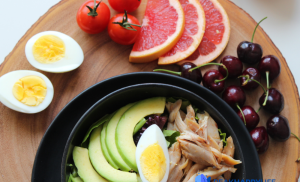Baking As Meditation: Mindful Self-Care In The Kitchen
Imagine stepping into the soothing embrace of your kitchen, armed with flour, sugar, and a pinch of mindfulness. In an increasingly fast-paced world, finding moments of calm can be a challenge, but what if the secret to tranquility was hidden amidst the measuring cups and mixing bowls? “Baking as Meditation: Mindful Self-Care in the Kitchen” explores the art of using baking as a form of meditation, allowing you to nourish not only your body but also your mind and soul. Join us on this delectable journey as we unlock the hidden potential of the kitchen as a sanctuary for self-care.
The Benefits of Baking as Meditation
Reducing Stress and Anxiety
Baking can be a wonderfully therapeutic activity that helps to reduce stress and anxiety. The act of measuring ingredients, mixing them together, and seeing a beautiful creation come to life can be incredibly calming and soothing. The repetitive motions of stirring, kneading, and whisking can help to quiet the mind and focus your attention on the present moment.
Increasing Mindfulness and Presence
When you engage in baking as a form of meditation, you are encouraged to be fully present in the process. By paying attention to the texture of the dough, the aroma of the ingredients, and the sounds of your mixing, you can cultivate mindfulness. Being fully present in the moment can help to alleviate worries about the past or future and bring your attention to the here and now.
Promoting Creativity and Self-Expression
Baking is not only about following a recipe; it is also an opportunity to unleash your creativity and express yourself. With the wide range of ingredients, flavors, and decorations available, there is ample room for experimentation and personalization. Whether you choose to add a unique spice, create an intricate design, or incorporate a special ingredient, baking allows you to express your individuality and create something truly unique.
Enhancing Cognitive Function
Engaging in baking as meditation can have positive effects on your cognitive function. The intricate processes and mindful actions involved in baking stimulate your brain and promote the development of cognitive skills, such as problem-solving, attention to detail, and decision-making. Additionally, following recipes and measuring ingredients can improve your mathematical skills, further enhancing your cognitive abilities.
Building Self-Esteem and Confidence
Baking can be a confidence-boosting activity that helps to build self-esteem. As you successfully create delicious treats, you gain a sense of accomplishment and pride in your baking skills. Each time you bake, you have the opportunity to challenge yourself, try new techniques, and develop your expertise. This continual growth and mastery can contribute to a positive sense of self and increased confidence in your abilities.
Creating a Mindful Baking Practice
Setting Intentions
Before you begin your baking session, take a moment to set your intentions. Decide if you want to focus on relaxation, creativity, or simply enjoying the process. Setting clear intentions can help you stay focused and present throughout the baking experience.
Preparing the Space
Creating a peaceful and clutter-free space is essential for a mindful baking practice. Clear off your countertops, organize your ingredients and utensils, and create a clean and inviting environment. By eliminating distractions and creating a harmonious space, you can fully immerse yourself in the baking process.
Engaging the Senses
Baking is a multisensory experience that can be enhanced by engaging all of your senses. Notice the vibrant colors of your ingredients, inhale the fragrant aroma of the freshly baked goods, listen to the soothing sounds of mixing and kneading, and savor the delicious taste and texture of the final product. By actively engaging your senses, you can heighten your mindfulness and deepen your baking experience.
Staying Present in the Process
As you bake, it is essential to stay present in the process and resist the temptation to rush or multitask. Focus on each step of the recipe, paying close attention to the measurements, timing, and techniques involved. If your mind starts to wander, gently bring your attention back to the present moment and the task at hand.
Embracing Imperfections
In the pursuit of perfection, it’s important to remember that baking, like life, is full of imperfections. Embrace any mistakes or unexpected outcomes as opportunities for learning and growth. Use them as reminders to practice self-compassion and to let go of the need for everything to be perfect. Baking is about the joy of the process and the enjoyment of the final product, rather than achieving flawless results.
Recipes to Inspire Mindful Baking
Simple and Nurturing Banana Bread
Banana bread is a classic recipe that is not only delicious but also perfect for practicing mindful baking. As you measure and mix the ingredients, take a moment to appreciate the natural sweetness of ripe bananas and the comforting aroma of warm spices. Nourish your body and soul with each bite of this simple yet satisfying treat.
Delicious Morning Meditation Muffins
Start your day with a mindful baking practice by preparing morning meditation muffins. These muffins can be customized with your favorite fruits, nuts, or spices, allowing you to infuse them with your unique preferences. As you leisurely mix the ingredients and carefully spoon the batter into the muffin cups, savor the peacefulness of the morning and the anticipation of a delightful breakfast.
Comforting Mindfulness Cookies
Baking a batch of mindfulness cookies can bring a sense of comfort and warmth to your mindful baking practice. Whether it’s the familiar scent of chocolate chip cookies or the delicate sweetness of shortbread, these cookies can evoke nostalgic feelings and provide a moment of pure indulgence. Pay close attention to the texture and flavors as you mix and bake these treats, allowing yourself to fully enjoy the experience.
Soothing Zen-inspired Tea Cake
For a truly calming and meditative experience, try baking a Zen-inspired tea cake. This delicate and subtly flavored cake is perfect for enjoying alongside a cup of tea, allowing you to fully appreciate the textures and flavors. Take your time to measure each ingredient precisely and gracefully fold them together, embracing the serene ambiance of the moment.
Tools and Techniques for Mindful Baking
Choosing High-Quality Ingredients
Mindful baking begins with selecting high-quality ingredients. Look for fresh and organic options whenever possible, as they can enhance the flavor and overall experience of your baked goods. Read labels, research brands, and support local suppliers to ensure that you are using the best ingredients available.
Using Traditional Baking Methods
Traditional baking methods often involve slow and deliberate processes that allow you to be fully present in the moment. Instead of relying on shortcuts or modern conveniences, embrace the timeless techniques of creaming butter and sugar, gently folding ingredients together, and patiently waiting for dough to rise. These methods can deepen your engagement with the baking process and heighten your enjoyment.
Experimenting with New Flavors and Textures
Mindful baking encourages you to explore new flavors and textures in your recipes. Be curious and open-minded, and don’t be afraid to try unique combinations or experiment with alternative ingredients. By stepping out of your comfort zone, you can expand your culinary horizons and create truly innovative and delicious baked goods.
Exploring Alternative Baking Techniques
In addition to traditional baking methods, there are alternative techniques that can add a new dimension to your mindful baking practice. Consider exploring techniques such as gluten-free baking, vegan baking, or sourdough fermentation. These techniques can challenge you to think outside the box and broaden your understanding of baking.
Sharing the Experience: Mindful Baking with Others
Hosting a Baking Meditation Gathering
Bring together friends, family, or like-minded individuals for a baking meditation gathering. Create a warm and inviting atmosphere where everyone can share their love for baking and mindfulness. As you bake together, encourage open conversation, mindfulness exercises, and the sharing of baking tips and recipes. This communal experience can deepen your connection with others and foster a sense of community.
Teaching Mindful Baking to Kids
Teaching children the art of mindful baking can be a wonderful way to introduce them to mindfulness practices. By involving them in measuring, mixing, and decorating, you can teach them the importance of being present and attentive. Encourage their creativity, celebrate their accomplishments, and use baking as an opportunity to bond and create lasting memories.
Partnering with a Loved One for a Mindful Baking Session
Baking with a loved one can be a special and intimate experience. Whether it’s a partner, sibling, or friend, invite them to join you in your mindful baking practice. Share the responsibilities, take turns measuring and mixing, and enjoy the process together. This shared experience can deepen your connection, promote mindfulness, and create beautiful memories.
Mindful Clean-Up: Bringing Awareness to the Aftermath
Cleaning as a Meditative Practice
The mindful baking experience doesn’t end when the treats come out of the oven. Pay attention to the cleaning process as an opportunity for further meditation. Approach each dish, utensil, and surface with care and gratitude. Notice the sensations of warm water, the scent of soap, and the satisfaction of returning your space to its pristine state.
Reducing Waste and Promoting Sustainability
Mindful baking also involves being conscious of the impact of our actions on the environment. Look for ways to reduce waste and promote sustainability in your baking practice. Consider using reusable baking mats, silicone molds, or biodegradable packaging. Plan ahead to minimize food waste and donate any excess baked goods to local shelters or community organizations.
Reflecting on the Baking Experience
After your mindful baking session, take a few moments to reflect on the experience. Consider how it made you feel, what you learned, and any insights or revelations that arose during the process. Writing in a journal or discussing your reflections with a trusted friend can help solidify your mindfulness practice and encourage further personal growth.
Overcoming Challenges in Mindful Baking
Dealing with Unexpected Results
Baking, like life, can often come with unexpected results. Instead of viewing these outcomes as failures, approach them as opportunities for learning and growth. Embrace the imperfections, adjust your techniques or ingredients if necessary, and allow yourself to have fun in the process. Remember that even in the face of challenges, mindful baking is about the journey, not just the end result.
Cultivating Patience and Acceptance
Mindful baking requires patience and acceptance, as not everything will go according to plan. Embrace the slower pace, let go of expectations, and savor each moment as it unfolds. Cultivate acceptance for the inevitable bumps along the way, and use them as reminders to practice patience and flexibility in all aspects of life.
Managing Time and Expectations
Time management is crucial in mindful baking, as it can be easy to become consumed by the process and lose track of time. Plan ahead, allocate sufficient time for each step, and avoid rushing. Be realistic with your expectations, understanding that baking is an art that takes time to master. By managing your time and adjusting your expectations, you can fully enjoy the mindful baking experience.
Finding Inspiration and Motivation
Incorporating mindful baking into your routine may require finding inspiration and motivation. Seek out new recipes, explore baking blogs and cookbooks, and connect with other baking enthusiasts. Surround yourself with visuals, quotes, and stories that ignite your passion for baking. By maintaining a source of inspiration, you can stay motivated and continue to nurture your mindful baking practice.
Taking Mindful Baking Beyond the Kitchen
Incorporating Mindful Eating
Mindful baking and mindful eating go hand in hand. Once your baked goods are ready to enjoy, take the time to savor each bite mindfully. Notice the flavors, textures, and sensations in your mouth. Be fully present and appreciative of the nourishment and pleasure that your creations bring. By bringing mindfulness to your eating habits, you can deepen your overall experience of mindful baking.
Applying Mindfulness in Everyday Activities
The mindfulness cultivated through baking can easily be applied to other activities in your daily life. Whether it’s washing dishes, folding laundry, or walking in nature, bring the same level of attention and presence to these activities. Use everyday tasks as opportunities to connect with yourself, reduce stress, and find joy in the simplest of tasks.
Using Baking as a Form of Self-Care and Expression
Beyond the kitchen, mindful baking can be a form of self-care and creative expression. Allow yourself the space and time to bake as a form of self-nurturing and relaxation. Experiment with flavors, decorations, and techniques as a way of expressing your unique creativity. Whether you bake for yourself or to share with others, let the process be a form of self-expression and an act of self-love.
Exploring the Connection Between Baking and Emotional Well-being
The Therapeutic Effects of Baking
Baking has long been recognized as a therapeutic activity that can benefit emotional well-being. The process of baking can be soothing, comforting, and even cathartic. As you mix and knead, you may find a release of tension and stress. Baking provides a safe and creative outlet for emotions, allowing you to channel your feelings into something beautiful and delicious.
Expressing Emotions through Baking
Baking can be a powerful way to express and process emotions. If you’re feeling sad, you may find solace in baking a comforting cake. If you’re feeling joyful, you may be inspired to create a colorful and celebratory dessert. By allowing yourself to connect with your emotions and use baking as a form of self-expression, you can gain a deeper understanding of your feelings and nurture your emotional well-being.
Using Baking as a Tool for Self-Reflection and Healing
Baking can serve as a tool for self-reflection and healing. As you engage in the mindful baking process, take the opportunity to reflect on your thoughts, emotions, and experiences. Baking can provide a safe space for introspection and can be a gentle and nurturing way to process and heal emotional wounds. It allows for quiet contemplation and self-awareness, leading to a greater understanding and acceptance of oneself.
Conclusion: Cultivating Mindfulness through Baking
Integrating Baking into a Mindful Lifestyle
Baking as meditation is not just a one-time activity but a way of life. By integrating baking into your daily or weekly routine, you can cultivate mindfulness on a consistent basis. Embrace the mindful baking practices discussed and make it a regular part of your self-care and well-being routine.
Embracing the Joy of Mindful Baking
While the benefits of baking as meditation are numerous, it’s important not to lose sight of the joy that comes from the process. Embrace the delightful aromas, the sense of accomplishment, and the simple pleasure of sharing delicious treats with loved ones. Allow yourself to be fully present and open to the joy that mindful baking can bring.
Continuing the Journey of Self-Care
Mindful baking is just one facet of self-care. Continue to explore other ways in which you can nurture your mind, body, and spirit. Whether it’s through yoga, journaling, or spending time in nature, find what brings you joy and peace. Remember that self-care is a lifelong journey, and mindful baking can be a beautiful and delicious part of that journey.

















